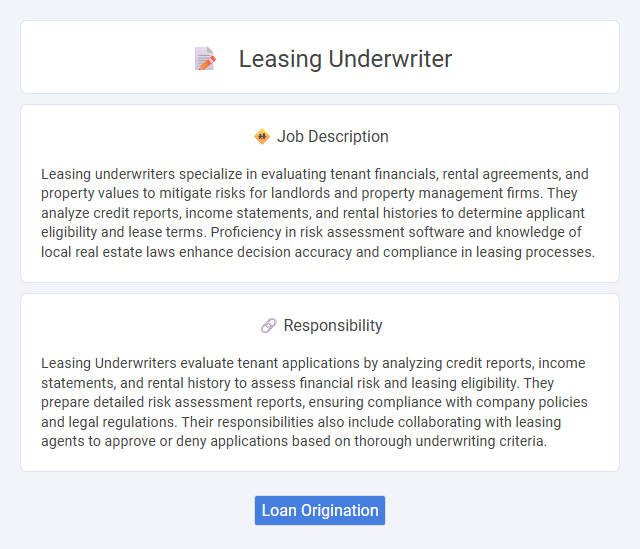
Leasing underwriters specialize in evaluating tenant financials, rental agreements, and property values to mitigate risks for landlords and property management firms. They analyze credit reports, income statements, and rental histories to determine applicant eligibility and lease terms. Proficiency in risk assessment software and knowledge of local real estate laws enhance decision accuracy and compliance in leasing processes.
Individuals with strong analytical skills and attention to detail are likely suitable for a Leasing Underwriter position, as the role demands thorough evaluation of lease applications and financial documents. Those comfortable working with numbers and assessing risk probabilities may find this job aligns well with their abilities. Conversely, people who struggle with critical thinking or prefer less structured tasks might find the responsibilities of underwriting challenging.
Qualification
A Leasing Underwriter must possess strong analytical skills and in-depth knowledge of real estate finance, credit analysis, and risk assessment. A bachelor's degree in finance, accounting, business administration, or a related field is typically required, along with experience in leasing, underwriting, or property management. Proficiency in financial modeling software, attention to detail, and excellent communication skills are essential for evaluating lease applications and making informed decisions.
Responsibility
Leasing Underwriters evaluate tenant applications by analyzing credit reports, income statements, and rental history to assess financial risk and leasing eligibility. They prepare detailed risk assessment reports, ensuring compliance with company policies and legal regulations. Their responsibilities also include collaborating with leasing agents to approve or deny applications based on thorough underwriting criteria.
Benefit
Leasing underwriters likely provide significant benefits by accurately assessing tenant creditworthiness and ensuring lease agreements minimize financial risks for property owners. Their expertise probably enhances cash flow stability by reducing default rates and optimizing lease terms. Employers may also experience improved portfolio performance and decreased vacancy periods due to thorough tenant screening and risk management.
Challenge
Leasing underwriters likely face the challenge of accurately assessing tenant financial risk while balancing the need to maximize property occupancy. The complexity of analyzing diverse credit profiles and market conditions may require advanced analytical skills and attention to detail. Navigating regulatory compliance and evolving real estate trends could add further layers of difficulty to their decision-making process.
Career Advancement
Leasing Underwriters evaluate tenant creditworthiness and lease risk, providing critical assessments for property managers and landlords. Expertise in financial analysis, risk assessment, and market trends opens pathways to senior underwriting, portfolio management, or real estate finance roles. Continuous skill development in regulatory compliance and negotiation techniques enhances prospects for leadership positions within real estate and asset management firms.
Key Terms
Loan Origination
Leasing underwriters specializing in loan origination assess financial documents, credit histories, and risk factors to approve or deny lease financing applications. Expertise in analyzing borrower creditworthiness and lease terms ensures optimal loan structuring that aligns with company risk policies. Utilizing advanced underwriting software, these professionals streamline approval processes to enhance portfolio quality and reduce default rates.
 kuljobs.com
kuljobs.com